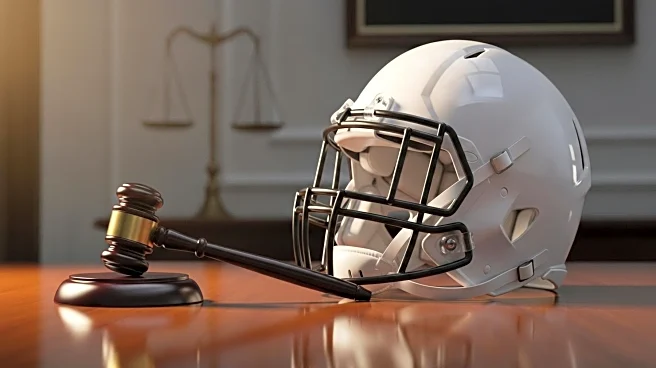What's Happening?
Diego Pavia, the quarterback for Vanderbilt Commodores, is playing his sixth season of college football in 2025. Pavia's eligibility was secured through a legal battle with the NCAA, which he initiated last year. The case revolved around NCAA rules concerning player eligibility during the 2020 COVID-19 season. Pavia's lawsuit argued that these rules unfairly restricted players from benefiting from their name, image, and likeness (NIL). In December 2024, a federal judge granted Pavia a preliminary injunction, allowing him an additional year of eligibility. The NCAA's appeal against this decision was dismissed, effectively granting Pavia the right to play for Vanderbilt in 2025. Pavia, originally from Albuquerque, New Mexico, began his college career at New Mexico Military Institute before transferring to New Mexico State and eventually Vanderbilt.
Why It's Important?
The case of Diego Pavia highlights significant issues within NCAA regulations, particularly concerning player eligibility and NIL rights. The legal victory for Pavia could set a precedent for other athletes seeking to extend their college careers under similar circumstances. This development may influence future NCAA policies and encourage more athletes to challenge existing rules that limit their ability to profit from their athletic careers. The decision also underscores the growing importance of NIL rights in college sports, potentially leading to broader changes in how athletes are compensated and how eligibility is determined.
What's Next?
With the court ruling in his favor, Pavia will continue to play for Vanderbilt in the 2025 season. The NCAA may need to reassess its eligibility rules, especially in light of increasing legal challenges from athletes. This case could inspire other players to seek similar legal remedies, potentially leading to more widespread changes in NCAA policies. Stakeholders in college sports, including universities and athletic associations, may need to adapt to these evolving legal and regulatory landscapes.
Beyond the Headlines
The implications of Pavia's case extend beyond individual eligibility, touching on broader ethical and legal dimensions in college sports. The focus on NIL rights reflects a shift towards recognizing athletes' contributions and their right to benefit financially from their talents. This case may prompt discussions about the balance between maintaining amateurism in college sports and allowing athletes to capitalize on their marketability. Long-term, this could lead to a reevaluation of the traditional college sports model.










